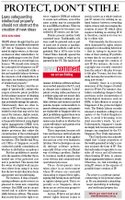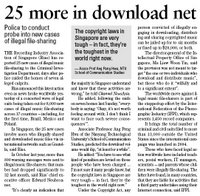Intellectually Property Rights - Right or Wrong?
This is an interesting article about Intellectual Property (IP) Rights, and how it all seems to be skewed towards the protection of the rights owners - even if it seems detrimental to the rights of everyone else. I particularly like how IP Rights holders are likened to "RENT SEEKERS".  And all this comes at a time when Asian governments are taking more action against those who are deemed to have infringed on IP rights. From taking action against mall building management for "tolerating/encouraging" IP pirates on their premises in Malaysia, to the recent arrest of 3 mp3 downloaders in Singapore (due to a tip-off from RIAS, the Recording Industry Association of Singapore). Below is an article of RIAS making police reports against 25 more individual music downloaders.
And all this comes at a time when Asian governments are taking more action against those who are deemed to have infringed on IP rights. From taking action against mall building management for "tolerating/encouraging" IP pirates on their premises in Malaysia, to the recent arrest of 3 mp3 downloaders in Singapore (due to a tip-off from RIAS, the Recording Industry Association of Singapore). Below is an article of RIAS making police reports against 25 more individual music downloaders. So, what do I think of IP rights?
So, what do I think of IP rights?
I think it has all gone overboard. I respect the IP rights of songwriters, authors, software developers etc... but I think they are GROSSLY IRRESPONSIBLE in the way they carry out their business.
IP owners operate their businesses using technology designed to be as convenient and as accessible to as many people as possible ie. digital data which is easily stored, copied, shared and transmitted. They use digital data to store & sell their IP because it lowers their cost of doing business (increasing their margins). However this practice also makes it ridiculously easy for other people to store, copy, share and transmit that same IP. More importantly, it makes it IMPOSSIBLE for IP owners to CONTROL who can manipulate their IP.
So, what have IP owners done? They have somehow persuaded the authorities to make the USERS responsible to CONTROL the IP ON BEHALF of the owners. This is PURE and UTTER RUBBISH!
Let me illustrate using a comparative.
Imagine that you sell fruits (IP). The cheapest way for you to sell fruit is to put a basket of it at the entrance of the train station (DIGITAL DATA). You put up a sign asking customers to take what they want from the basket and then pay by tossing the money into basket. You leave the basket of fruit unattended (EASE OF COPYING, SHARING and TRANSMISSION).
Now, who do you think should be held responsible if someone takes the fruit without paying? Should the person taking the fruit (mp3 downloader) be blamed? Yes. Should the train station manager (shopping mall mgt) be blamed? Maybe. But how can it be, that the fruit seller is blameless for leaving his damned fruit unattended?
Should the fruit seller be allowed to simply leave the basket of fruit and walk away, and then blame people who are tempted by the lack of security to take the fruit without paying?
Isn't this called ENTRAPMENT? When the police conduct vice raids, undercover policewomen cannot solicit men. They have to wait for men to proposition them. Solicitation creates an OPPORTUNITY for those men to break the law (an opportunity which they would not have had otherwise). To solicit, tempt or encourage those men in any way would have made the undercover policewomen ACCESSORIES to the crime. So, by the same logic, isn't the fruit seller doing the same thing by leaving his fruits unattended, tempting every passerby with the ease by which they can be stolen?
And why should fruit be so special? For every other type of property, it is the owners' responsibility to make sure they are safe and secure. Their liability rises if they cannot show that they have ensured the security of their property. Why should fruit be different? Aren't they just as guilty for NEGLIGENTLY leaving their property in harm's way? How much sympathy should you get if your car is stolen because you left the door open and keys in the ignition?
If airports and customs can penalise passengers for contrabrand put into their baggage when it is left unattended, then why can't we penalise the fruit seller?!
So, shouldn't the IP owners be forced to change their business model, instead of blaming everyone else for what is essentially their own stupidity & laziness? Should everyone else be penalised for their reluctance and inability to keep up with the rapid changes in how IT is used?



No comments:
Post a Comment